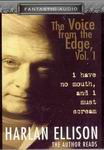
 A Game of Thrones
A Game of Thrones
By George R.R. Martin; Read by Roy Dotrice
19 Cassettes – 34 Hours [UNABRIDGED]
Publisher: Random House Audio
Published: 2004
ISBN: 0739308688
Themes: / Fantasy / Medieval setting / Power struggle / Dragons /
A Game of Thrones is the first of six projected volumes of George R.R. Martin’s A Song of Ice and Fire fantasy series. It was published in 1997, where it joined a host of other fat fantasy series, including Robert Jordan’s Wheel of Time series and Terry Goodkind’s Sword of Truth series. With many fully realized characters and subplots that don’t fail to surprise, Martin’s series stands tall above the rest in the genre. This particular volume won the Locus Award for Best Fantasy Novel (1997) and was nominated for the Best Novel Nebula Award.
I was very much looking forward to the audio version of this novel, and followed some of the discussion on George R.R. Martin’s website concerning it. He apparently rejected an offer to make a 9-hour abridged version of the book, which he felt would be more of a summary than a novel. He was right – this unabridged version is 34 hours long, and I for one am delighted that he waited.
A Game of Thrones is not fantasy in the style of Tolkien. In fact, it has much more in common with Herbert’s Dune than Tolkien’s Lord of the Rings. The book is a chess game played by various Houses in a quest for power in a land called Westeros. The setting is medieval, with kings, knights, lords, and ladies. At the beginning of the novel, we’re introduced to House Stark, led by Lord Eddard Stark of Winterfell. He and his family live in a castle in the northern country, and are reminded often that winter is coming… in more ways than one. Eddard’s wife is Catelyn, formerly of House Tully, and their children are Robb, Sansa, Arya, Bran, and Rickon. Eddard also fathered a bastard named Jon Snow – his mother is a mystery to all but Eddard.
The struggle around which everything revolves is between House Stark and House Lannister. Cersei, the king’s wife, is of that house, as is Jaime, her twin brother, and Tyrion, a dwarf. Every one of the characters mentioned play important roles in the story, and because they are so realistically portrayed, they are not difficult to tell apart, nor are they hard to remember as they love, fight, promise, and betray.
What makes this novel fantasy? Magic plays a very small role in the story. The characters in this novel are all grey, unlike the black and white good/evil of typical fantasy characters. But there is a growing supernatural threat in the north, introduced in the Prologue. And there is also Danerys Targaryen, of the house that held the throne years before the events in this novel, who is coming of age… and Targaryens are known for their dragons.
George R.R. Martin’s writing style is very easy to follow, and translates beautifully to the spoken word. Roy Dotrice does an excellent job. In my opinion, his performance is on par with Jim Dale’s reading of the Harry Potter novels. Many, many characters present themselves here, just as in the Potter novels, yet Dotrice, like Dale, manages to keep them all separated and gives them all distinct mannerisms and voices that keep the story flowing. I caught a few mispronunciations in the book, all names where Dotrice gets caught up in the moment and calls Prince Joffrey “Jeffrey”, for example, or pronounces the name “Varys” two different ways. This did cause me pause, but it happened only a few times in the 34 hour performance.
This was one of my favorite novels before I listened to this audiobook. Martin has created a realistic world peopled with authentic characters that are not difficult to care about. The book runs me through a huge range of emotions as the complex plot runs its course. This audiobook enhanced the experience – listening to Dotrice’s performance was like reading it again for the first time.
 Neverwhere
Neverwhere Alien Voices: The Invisible Man
Alien Voices: The Invisible Man
 The Voice from the Edge Vol 1: I Have No Mouth and I Must Scream
The Voice from the Edge Vol 1: I Have No Mouth and I Must Scream The Wind from a Burning Woman
The Wind from a Burning Woman The Hedge Knight
The Hedge Knight